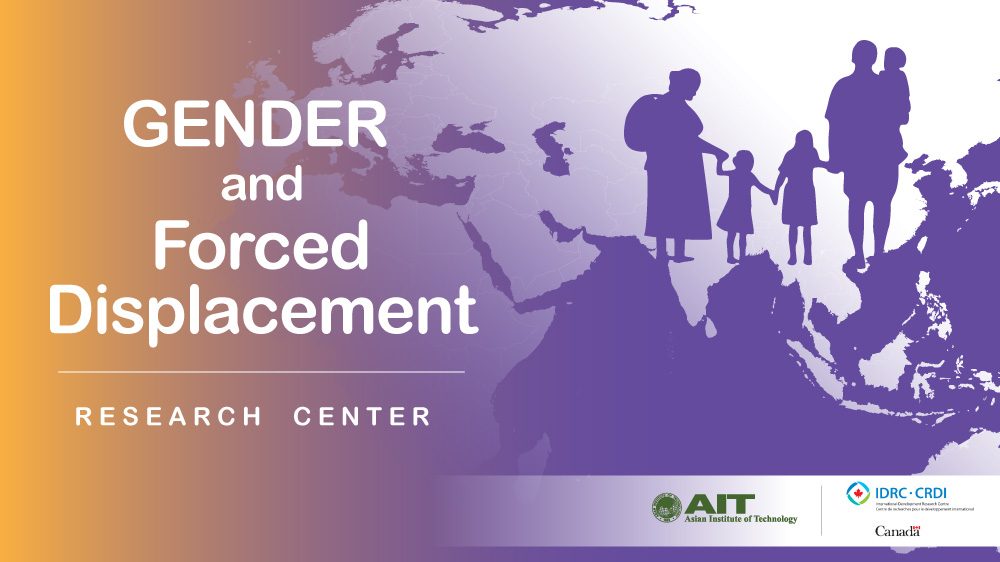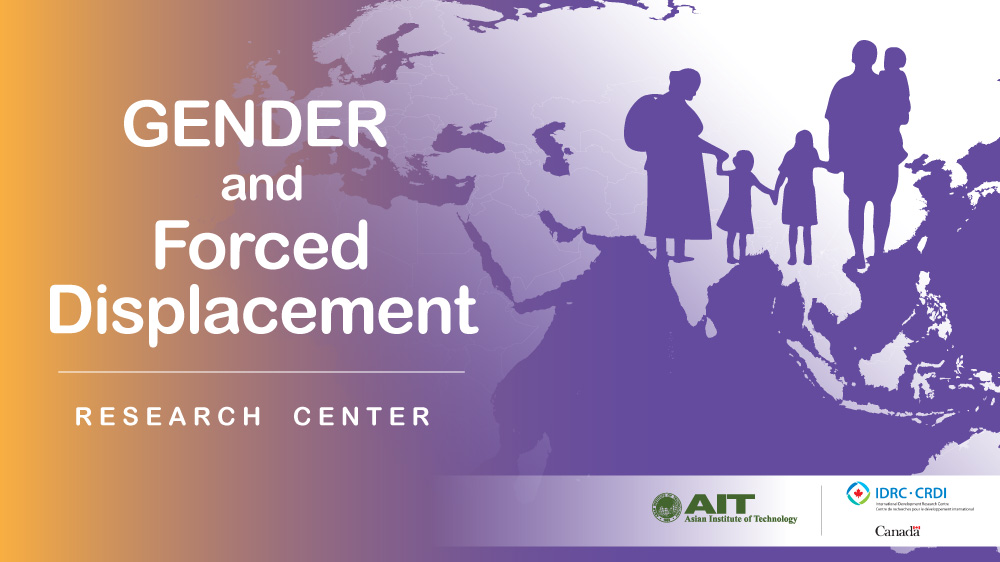By Office of Public Affairs
Bangkok, March 18, 2022 – The Asian Institute of Technology (AIT) is among eight universities awarded by the International Development Research Centre (IDRC) to establish regional research chairs and research hubs in the Global South focusing on forced displacement. The open competitive call for proposal globally has led to the establishment of eight such positions across the South and Southeast Asia, Middle East, and East Africa and Central and South America.

The search for the Chair Professor to head the initiative at AIT is currently underway. They will lead AIT’s research on gender in the context of conflict-induced, climate change & disaster-induced, and development-induced forced displacement to create a basis for evidence-based advocacy for the region. Professor Kyoko Kusakabe and Assistant Professor Joyee S. Chatterjee of AIT’s Gender & Development Studies, the two minds behind the winning proposal, are leading the search. Together, they highlight why this center, its research, and the Chair, matter a great deal to the region.
The United Nations High Commissioner for Refugees (UNHCR) reported that 82.4 million people were forcibly displaced at the end of 2020 worldwide. More than two thirds or 68% of all refugees and those displaced abroad came from just five countries: Syrian Arab Republic (6.7 million), Venezuela (4 million), Afghanistan (2.6 million), South Sudan (2.2 million) and Myanmar (1.1 million). Additionally, 48 million people are internally displaced. All is as a result of persecution, conflict, violence, human rights violations, or events seriously disturbing public order – accordingly to the report.
In the Greater Mekong Sub-Region specifically, the two Gender and Development Studies professors pointed to the growing pressures from shaky democracies, vulnerability to environmental disasters, rapid infrastructure development, and tourism development that are set to increase the frequency and severity of forced displacement. Unless policy responses and academic research incorporate gender dynamics – “People who are marginalized will further be marginalized in this kind of emergency situation,” Prof. Kusakabe explained.
“Forced displacement has historically been around for a long time, but how we understand this in the current global and regional context(s) is the question,” Dr. Chatterjee added. While there are already research centers focusing on certain aspects, such as peace studies center which focuses on war and violence aspect or center for climate change focusing on environmental aspect, the Gender and Forced Displacement Center will focus specifically on aspects that are the drivers of forced displacement in contemporary times – employing the lens of gender and a regional focus. Essentially, the Gender and Forced Displacement Center aims to be a hub for the studies on gender and forced displacement of the region and contribute to the ongoing global dialogue.
Driven by a large gap between knowledge on drivers of forced displacement and gender-sensitive policy responses in the region, the aim for the Center is to “create evidence-based advocacy where gender issue in forced displacement is made much more visible,” Prof. Kusakabe stressed.
To achieve that, the Center has to be led by a Chair Professor who can connect the various efforts of different people, and organizations for a better understanding of the issue in a systematic manner, while also giving voice to the people affected by forced displacement in the region. The role of the Chair is composed of three major components: 1) mentoring and supporting early-career scholars and students, 2) working on community outreach/growing network, and 3) engaging in policy processes. Given the nature of the subject, the quality of being well connected with people working on the ground is of great importance. In any case, gender expertise is a must.
“There are more and more events, whether natural or human-made disasters that are happening, we see that this issue is continuing to escalate and grow in many dimensions,” Dr. Chatterjee further described the issue to be addressed by the Chair as, “a global priority.”
To this end, being hosted at AIT bolsters the Chair’s work through levering of AIT’s existing networks and its vibrant research presence in the region. In addition to already being part of the network of NGOs and groups working on displacement; democracy; labor migration; and human rights, AIT is situated in Bangkok where many global organizations have regional offices in.
As a basis for sustainable development, in which AIT has played an integral role in the region for over six decades, a people-centered development is indispensable. The Chair of the Gender and Forced Displacement will join forces at the institute to build and strengthen capacity to address this issue vital to sustainable development of the region.
Prof. Kusakabe reiterated the importance of this initiative by way of conclusion, “through the center, we’d create more opportunities for networking, build more capacity, make the issue more visible and more focused, and bring a more grounded and accessible discussion to the public.”
Applications for the Chair position are currently being accepted. For more information or to apply, visit: https://bit.ly/3udGHHD
---

